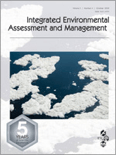
Integrated Environmental Assessment and Management
Scope & Guideline
Exploring the nexus of science and geography for impactful solutions.
Introduction
Aims and Scopes
- Ecological Risk Assessment:
The journal emphasizes methodologies for assessing ecological risks posed by chemicals, pollutants, and other anthropogenic activities on ecosystems, focusing on the development and application of frameworks that integrate ecological and exposure data. - Sustainability and Life Cycle Assessment:
A significant focus is placed on sustainability assessments using life cycle analysis (LCA) to evaluate the environmental impact of products and processes, particularly in relation to chemical management and resource recovery. - Pollution and Contamination Management:
The journal addresses various aspects of pollution, including the assessment, management, and remediation of contaminated sites, with a particular emphasis on emerging contaminants such as PFAS and microplastics. - Interdisciplinary Approaches:
It promotes interdisciplinary research that incorporates ecological, social, and economic dimensions in environmental assessments, recognizing the complexity of environmental issues and the need for comprehensive solutions. - Climate Change and Environmental Resilience:
Research on the impacts of climate change on ecosystems and the development of adaptive management strategies to enhance resilience against climate-related stressors is a core area of focus.
Trending and Emerging
- Emerging Contaminants Research:
There is a significant increase in studies focusing on emerging contaminants, such as PFAS and microplastics, examining their environmental impact, exposure pathways, and management strategies. - Integration of Indigenous Knowledge:
Recent publications emphasize the importance of integrating Indigenous knowledge and perspectives into environmental assessments, acknowledging the value of traditional ecological knowledge in managing natural resources sustainably. - Machine Learning and Data-Driven Approaches:
The use of machine learning and advanced data analytics for environmental modeling and risk assessment is on the rise, reflecting a trend towards leveraging technology to improve the precision and efficiency of environmental assessments. - Climate Change Adaptation Strategies:
Research on adaptive management strategies to address climate change impacts is increasingly prominent, with a focus on resilience-building measures for ecosystems and communities. - Holistic and Multidisciplinary Frameworks:
There is a growing trend towards using holistic frameworks that combine ecological, economic, and social dimensions in environmental assessments, promoting integrated approaches to sustainability and management.
Declining or Waning
- Traditional Chemical Risk Assessment:
There has been a noticeable decline in publications focusing solely on traditional chemical risk assessment methods without integrating newer, more holistic approaches like weight-of-evidence and probabilistic modeling. - Historical Case Studies:
Research centered on historical case studies of environmental incidents, while still relevant, has diminished as the journal shifts towards more proactive and predictive assessments rather than retrospective analyses. - Single-Species Assessments:
The focus on single-species assessments is waning as the journal increasingly emphasizes ecosystem-level assessments and the interactions between multiple species and environmental stressors. - Regulatory Compliance Studies:
There is a noticeable decrease in studies that predominantly focus on compliance with existing regulations, as more researchers are looking to innovate and propose new frameworks rather than simply assess adherence to current standards. - Localized Environmental Impact Studies:
Research that addresses localized environmental impacts without broader implications or connections to global environmental challenges is becoming less frequent, reflecting a trend towards more integrative and comprehensive assessments.
Similar Journals

Challenges in Sustainability
Navigating the Path to Sustainable Practices and PoliciesChallenges in Sustainability, published by LIBRELLO PUBLISHING HOUSE in Switzerland, is a preeminent Open Access journal dedicated to advancing knowledge in the fields of sustainability, ecology, and environmental management. With its ISSN 2297-6477, this journal has been pivotal since its inception in 2013, providing a platform for innovative research and discourse on sustainable practices and policies. The journal currently holds a Q2 ranking in notable categories such as Ecology, Geography, Planning and Development, and Nature and Landscape Conservation, reflecting its significant contribution to these critical areas. Access options are freely available to foster a wider dissemination of knowledge, engaging researchers, professionals, and students alike. As the world grapples with pressing environmental challenges, Challenges in Sustainability serves as an essential resource for those seeking to address complex sustainability issues through interdisciplinary research and informed policy advocacy.

Ecological Indicators
Exploring vital indicators for a healthier planet.Ecological Indicators, published by Elsevier, is a prestigious journal dedicated to advancing the fields of ecology and environmental science. With an impressive impact factor and ranked in the Q1 quartile for both Ecology and Decision Sciences categories, the journal serves as a vital resource for researchers and professionals aiming to apply ecological knowledge to real-world problems. The journal covers a broad scope of topics within ecological indicators, aiming to provide comprehensive insights into biodiversity, ecosystem health, and sustainability metrics. Founded in 2001 and continuing through 2024, Ecological Indicators has established itself as a leader in disseminating significant research and innovative findings. The journal's standing is reflected in its remarkable Scopus ranks, placing it among the top percentile in its respective categories. Authors are encouraged to submit their work to share vital findings with an engaged audience of researchers, professionals, and dedicated students, ensuring the continued relevance and impact of ecological research on global environmental policies and practices.

Environmental Engineering Research
Empowering engineers to tackle environmental challenges.Environmental Engineering Research, published by the Korean Society of Environmental Engineers (KSEE), stands as a pivotal journal in the field of environmental engineering. With an ISSN of 1226-1025 and an E-ISSN of 2005-968X, this esteemed journal has shown remarkable growth since its inception, converging years from 2011 to 2024. The journal is recognized in the Scopus ranking system, holding a position of #46 out of 197 in the Environmental Science category, marking it in the 76th percentile—a testament to its impact and significance in the field. Furthermore, it enjoys a commendable Q2 ranking in Environmental Engineering for 2023. While the journal operates under a traditional access model, its commitment to disseminating vital research and innovative solutions for environmental challenges enhances its appeal to researchers, professionals, and students alike. The Environmental Engineering Research journal invites contributions that advance the understanding and application of engineering principles to environmental issues, providing a forum for scholars dedicated to fostering sustainability and environmental protection.
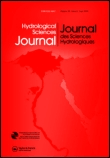
Hydrological Sciences Journal
Elevating understanding of our vital water systems.Hydrological Sciences Journal, published by Taylor & Francis Ltd, is a leading peer-reviewed publication dedicated to advancing the field of hydrology, spanning topics from water management to climate impacts on hydrological systems. With an impressive impact factor and a noted Q1 category ranking in Water Science and Technology, the journal occupies a pivotal role in the academic landscape, facilitating high-quality research dissemination since its inception in 1982. The journal is indexed in Scopus, holding a commendable rank of #48 out of 261 in the Environmental Science category, placing it in the 81st percentile among its peers. Although it does not offer Open Access options, the journal ensures extensive reach and readership through institutional subscriptions. As it converges toward its milestone of 2024, the Hydrological Sciences Journal remains an indispensable resource for researchers, professionals, and students eager to explore the latest advancements and methodologies in hydrological research.

Journal of Environmental Informatics
Transforming environmental challenges through innovative informatics.The Journal of Environmental Informatics, published by the International Society for Environmental Informatics, serves as a leading academic platform dedicated to advancing the interdisciplinary field of environmental informatics. With an ISSN of 1726-2135 and an E-ISSN of 1684-8799, this esteemed journal is based in Canada and reaches a global audience of researchers, professionals, and students alike. As a testament to its high academic standards, the journal has achieved a Q1 ranking in key categories such as Computer Science Applications, Decision Sciences, and Environmental Science for the year 2023, positioning it within the top tier of its field. Additionally, its impressive Scopus rankings reflect its influence and reach within the academic community, ranking #16 in General Environmental Science and #6 in General Decision Sciences. Covering crucial topics from environmental data management to decision-support systems tailored for sustainability practices, the Journal aims to disseminate innovative research that transforms the way environmental challenges are addressed. While it operates under traditional access categories, this journal invites contributions that enhance our understanding and application of informatics within environmental science, making it an invaluable resource for anyone invested in these pressing global issues.
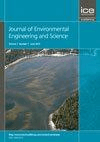
Journal of Environmental Engineering and Science
Pioneering Research for a Greener PlanetJournal of Environmental Engineering and Science, published by Emerald Group Publishing Ltd, is a prominent academic platform dedicated to the dissemination of cutting-edge research in the fields of environmental engineering, chemistry, and science. This journal, with ISSN 1496-2551 and E-ISSN 1496-256X, features a comprehensive collection of studies that delve into innovative methodologies and practical applications aimed at solving pressing environmental issues. Having been published since 2002, it spans critical research years from 2015 to 2024, offering insights that are invaluable to both academics and practitioners alike. With its current rankings placing it in the fourth quartile for Environmental Chemistry and Engineering, and the third quartile in miscellaneous Environmental Science, the journal serves as a significant yet under-utilized resource for emerging scholars seeking to contribute to the ecological discourse. Though it does not offer Open Access, the content is meticulously curated to uphold academic rigor, catering especially to researchers, professionals, and students keen on advancing their understanding of environmental challenges and engineering solutions.
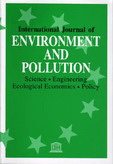
INTERNATIONAL JOURNAL OF ENVIRONMENT AND POLLUTION
Advancing Environmental Insights for a Sustainable FutureInternational Journal of Environment and Pollution is a pivotal publication in the field of environmental science, dedicated to advancing knowledge concerning pollution and its multifaceted impacts on ecosystems and human health. Published by InderScience Enterprises Ltd, this journal, which has been in circulation since 1991, serves as a vital platform for researchers, professionals, and students interested in the management, monitoring, policy, and law associated with environmental issues. With an ISSN of 0957-4352 and E-ISSN 1741-5101, it offers a critical perspective on pollution challenges, emphasizing Waste Management and Disposal. Although placed in the Q4 quartile of its categories, it remains an important resource for understanding the complexities of environmental impact, contributing to policy formulation and ecological research. The journal does not offer Open Access, but it can be accessed through various academic libraries and institutions that value comprehensive studies in environmental management. Engage with the latest findings and discussions that address pressing environmental concerns today!

Journal of Hazardous Materials Advances
Innovating solutions for hazardous material management.The Journal of Hazardous Materials Advances, published by ELSEVIER, is a premier open-access journal dedicated to advancing the understanding and management of hazardous materials. Established in 2021, this journal has quickly gained recognition, securing a place in the prestigious Q1 quartile across multiple categories, including Environmental Chemistry, Environmental Engineering, Health, Toxicology and Mutagenesis, Pollution, and Waste Management and Disposal. With its impactful research indexed under ISSN 2772-4166, the journal not only prioritizes quality but also promotes accessibility to its scholarly outputs, ensuring that vital findings are readily available to the global research community. As part of Scopus, the Journal ranks competitively in various subfields of Environmental Science, reflecting its vital role in addressing contemporary environmental challenges. Researchers, professionals, and students can rely on this journal to provide innovative insights and solutions in the ever-evolving landscape of hazardous material management and its implications for public health and environmental sustainability.
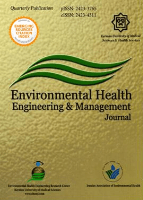
Environmental Health Engineering and Management Journal
Transforming Environmental Insights into Health SolutionsEnvironmental Health Engineering and Management Journal is a premier platform dedicated to the dissemination of research findings in the essential field of environmental health. Published by Kerman University of Medical Sciences in Iran, this Open Access journal has been a beacon of scientific inquiry since its inception in 2014. With an ISSN of 2423-3765 and E-ISSN 2423-4311, it facilitates broad accessibility to cutting-edge research that addresses the complex interactions between environmental factors and human health. With a notable categorization in the Q3 quartile for Environmental Science and Public Health, alongside Q4 in Chemical Health and Safety, the journal underscores its commitment to quality and relevance. Currently ranked #132 out of 233 in Environmental Science within Scopus, it serves as a crucial resource for researchers and practitioners striving to tackle contemporary environmental challenges. The journal's scope includes innovative methodologies, environmental risk assessment, and sustainable health practices, positioning it as an indispensable reference for those invested in improving public health outcomes through environmental engineering and management.
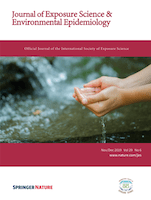
Journal of Exposure Science and Environmental Epidemiology
Advancing the Science of Health and EnvironmentJournal of Exposure Science and Environmental Epidemiology, published by SPRINGERNATURE in the United Kingdom, is a leading platform for researchers and practitioners dedicated to understanding the interplay between environmental factors and human health. With an impressive impact factor and Q1 and Q2 rankings across multiple categories such as Pollution and Public Health, the journal has established itself as a critical resource in the fields of epidemiology, toxicology, and environmental science. Covering a wide spectrum of studies from 2006 to 2024, it aims to disseminate timely research that empowers professionals and informs policy decisions. Although there is no open access option at this time, the journal's rigorous peer-review process ensures that only high-quality research is published, further cementing its reputation as a vital source of knowledge for advancing public health and environmental protection.